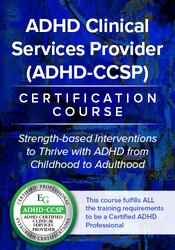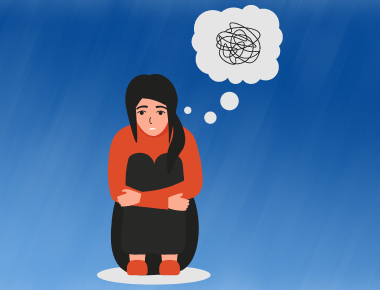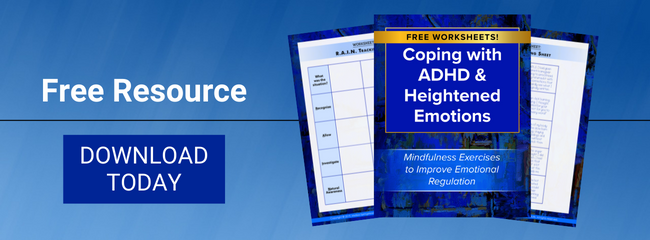Coping with ADHD & Heightened Emotions
Free printable exercise to use with adolescent & adult clients

Few people factor in the emotional challenges that are associated with a diagnosis of ADHD. In fact, it is not even a part of the diagnostic criteria.
However, people who have ADHD and those who support them know that emotions are a part of the struggle. People with ADHD don’t feel a different set of emotions than those without ADHD—rather, they feel both positive and negative emotions more intensely and frequently, and often for longer periods of time. It is often difficult for them to regulate their emotions, which causes them to respond to situations in an emotionally inappropriate way.
For example, some adolescents may have a hard time letting go of intense emotions when they are stressed, angry, or experiencing any other negative feeling. They may worry or become annoyed over what others may think are small things. Being sensitive is also a common emotional experience. Adolescents with ADHD frequently say that things “aren’t fair” because of their emotional sensitivity. Parents, caregivers, and teachers may find themselves getting frustrated when a person with ADHD “can’t seem to let things go.”
When we remember that ADHD causes difficulty with executive functioning, it can be easier to have some compassion and understanding in terms of why emotion regulation may be difficult. At the same time, even though ADHD makes it more difficult to regulate our emotions, it does not mean that we can allow each and every one of our emotions to rule our lives and determine how we react the exact moment we feel something. Instead, our goal is to have a foundational understanding of why things are happening and to then make choices that protect against any negative consequences.
However, adolescents with executive functioning difficulties may have trouble seeing the big picture. Instead, they tend to get stuck in whatever they feel in the moment, which leads them to react—vs. respond—to their emotions. As a result, they may avoid difficult tasks out of fear that they will have a negative emotional experience. On the other side, if they do attempt a difficult task, they may give up at any sign of emotional discomfort. They also may feel easily overwhelmed, which can lead them to avoid interacting with others. If any of the above has been true for your clients, you’ll find this tool to be very comforting and useful.
When clients can stop and say, “This is something that is happening due to my ADHD,” and not just because they are “overly emotional,” then they can make some changes. They can start to recognize when an emotional response does not feel right. It is only when they become curious about their emotions that they can respond to a situation rather than react. Note the key difference between those two words!
Once clients have paused and developed a curiosity about your emotions, they can choose how to proceed in the situation using mindfulness strategies, such as breathing techniques and/or guided meditations. The R.A.I.N Tracking Sheet will help to initially guide them through this process. Over time, they may notice that it gets easier and that they no longer need the worksheet. However, in the beginning, using the worksheet is helpful in order to track and learn from experience. Clients can use this free exercise during (or right before) highly emotional experiences.
This is an adapted exercise from ADHD in Teens & Young Adults: A Mindfulness Workbook to Keep You ANCHORED. You can order your copy here or receive an e-book of this resource when you register for our new comprensive ADHD training: ADHD Clinical Services Provider (ADHD-CCSP) Certification Course: Strength-based Interventions to Thrive with ADHD from Childhood to Adulthood.
However, people who have ADHD and those who support them know that emotions are a part of the struggle. People with ADHD don’t feel a different set of emotions than those without ADHD—rather, they feel both positive and negative emotions more intensely and frequently, and often for longer periods of time. It is often difficult for them to regulate their emotions, which causes them to respond to situations in an emotionally inappropriate way.
For example, some adolescents may have a hard time letting go of intense emotions when they are stressed, angry, or experiencing any other negative feeling. They may worry or become annoyed over what others may think are small things. Being sensitive is also a common emotional experience. Adolescents with ADHD frequently say that things “aren’t fair” because of their emotional sensitivity. Parents, caregivers, and teachers may find themselves getting frustrated when a person with ADHD “can’t seem to let things go.”
When we remember that ADHD causes difficulty with executive functioning, it can be easier to have some compassion and understanding in terms of why emotion regulation may be difficult. At the same time, even though ADHD makes it more difficult to regulate our emotions, it does not mean that we can allow each and every one of our emotions to rule our lives and determine how we react the exact moment we feel something. Instead, our goal is to have a foundational understanding of why things are happening and to then make choices that protect against any negative consequences.
However, adolescents with executive functioning difficulties may have trouble seeing the big picture. Instead, they tend to get stuck in whatever they feel in the moment, which leads them to react—vs. respond—to their emotions. As a result, they may avoid difficult tasks out of fear that they will have a negative emotional experience. On the other side, if they do attempt a difficult task, they may give up at any sign of emotional discomfort. They also may feel easily overwhelmed, which can lead them to avoid interacting with others. If any of the above has been true for your clients, you’ll find this tool to be very comforting and useful.
When clients can stop and say, “This is something that is happening due to my ADHD,” and not just because they are “overly emotional,” then they can make some changes. They can start to recognize when an emotional response does not feel right. It is only when they become curious about their emotions that they can respond to a situation rather than react. Note the key difference between those two words!
Once clients have paused and developed a curiosity about your emotions, they can choose how to proceed in the situation using mindfulness strategies, such as breathing techniques and/or guided meditations. The R.A.I.N Tracking Sheet will help to initially guide them through this process. Over time, they may notice that it gets easier and that they no longer need the worksheet. However, in the beginning, using the worksheet is helpful in order to track and learn from experience. Clients can use this free exercise during (or right before) highly emotional experiences.
This is an adapted exercise from ADHD in Teens & Young Adults: A Mindfulness Workbook to Keep You ANCHORED. You can order your copy here or receive an e-book of this resource when you register for our new comprensive ADHD training: ADHD Clinical Services Provider (ADHD-CCSP) Certification Course: Strength-based Interventions to Thrive with ADHD from Childhood to Adulthood.
Become an ADHD Clinical Services Provider (ADHD-CCSP)!

Get evidence-based behavioral, medication and relationship interventions to thrive with ADHD from childhood to adulthood! Learn from 10 of the foremost leaders in the field of ADHD. You’ll get proven strategies that work in the classroom and for family, social and adult relationships. Get more than 300 client worksheets, exercises and handouts you can’t get anywhere else! Best of all – earn certification – FOR FREE!
Meet the Expert:
Melissa Springstead Cahill, Psy.D., has dedicated her career to the psychosocial and mental health needs of adolescents for over a decade. She specializes in working with teens who struggle with ADHD, learning disabilities and other educational barriers.
Learn more about their educational products, including upcoming live seminars, by clicking here.
Learn more about their educational products, including upcoming live seminars, by clicking here.
Topic: ADHD | Children & Adolescents | Mindfulness
Tags: ADHD | How To | Self-Regulation | Teens | Tools | Wisdom






